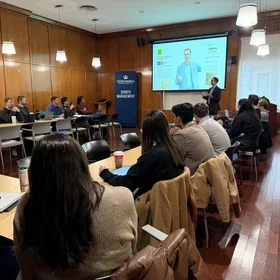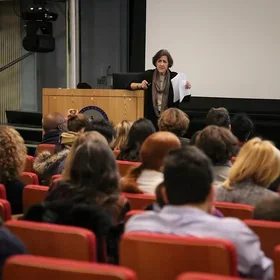Obiora Anekwe, a student in Columbia’s Bioethics master’s program, had his artwork, Doctor-Patient, a collage representing a moment from the Tuskegee Syphilis Study, reproduced as the cover of the December 2013 issue of Academic Medicine.
Q. What inspired Doctor-Patient?
Obiora Anekwe: As a bioethics student, I’ve been integrating that series within my coursework. I use the syphilis study as a case study analysis of what not to do in research.
I was born at the hospital where the experiments took place. I didn’t grow up there; I grew up in Lagos, Nigeria. But coming back there for graduate school and eventually working there for a number of years, and learning about how the study affected the development of bioethics as a field, always brought a great deal of interest to me. I’ve been very passionate about it.
What’s your background in art?
A lot of my training has been self-taught although my undergrad was mass media arts, so I was exposed to the visual arts and the performance arts. For me, art is one of the strongest foundations of learning in teaching people about subject matters that they ordinarily would not know about.
How has Columbia’s Bioethics program helped inform your art and your position in the field?
The training that I've received in the Bioethics program has given me the knowledge and flexibility to find a valuable, concrete, and pertinent place in the field.
The program itself has also given me some practical tools because I’m an intern at the New York State Psychiatric Institute on the Institutional Review Board (IRB). IRBs were formed as a result of unethical studies like Willowbrook and Tuskegee. My experience as an intern has enabled me to see the connectability between research, learning, and practice. It’s enabled me to have those experiences where I can really see what is written and what is researched and how it connects to current studies, clinical trials, and research studies, how important it is to protect human subjects, and how pertinent it is to ensuring these type of unethical studies won’t occur again.
You mention IRBs. What other changes have stemmed from unethical medical studies?
One of the ethical outcomes of the Tuskegee study is this formalized notion and concept of informed consent. You must inform patients of anything that is done to them that they are not aware of medically. Also the notion of medical deception. The patients that were syphilitic were not made aware of it. There was a euphemism that was used in that rural community—“bad blood.” They weren’t educated to know what “bad blood” was.
What’s next for you?
I just coauthored a book of essays and commentaries with my brother called Chronicling the Tuskegee Syphilis Study. I plan to do more research and interview family members of syphilis study survivors. In the future, I want to be able to do a documentary about that.


